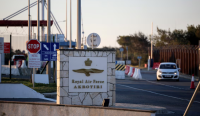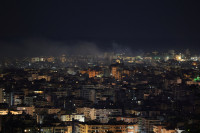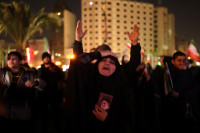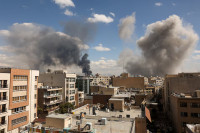World
Gaza truce holds as more Israeli hostages, Palestinian prisoners set for release
Both sides have said hostilities would resume as soon as the truce ends, though US President Joe Biden said there was a real chance of extending the truce.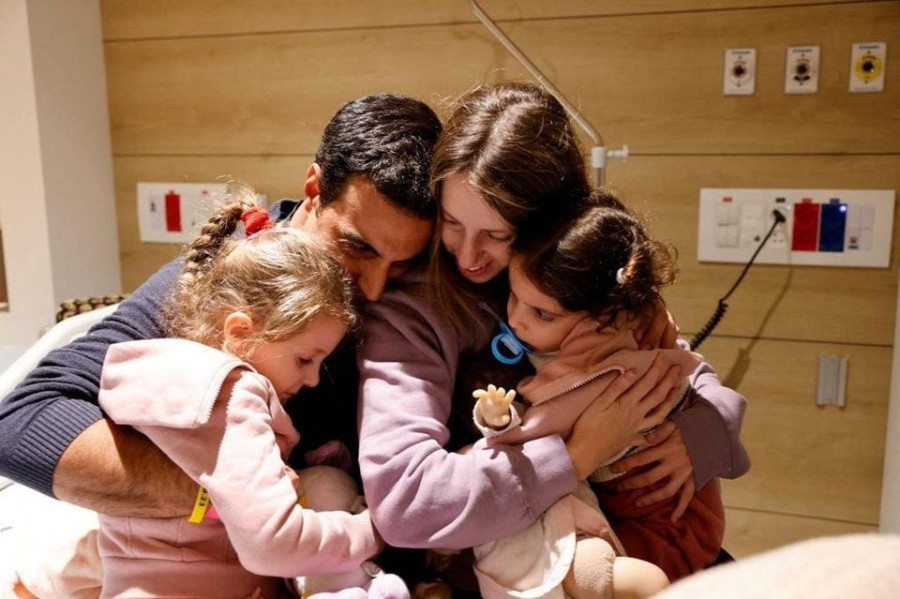
Reuters
Hamas was expected to release a second group of Israelis on Saturday as a planned four-day truce to allow an exchange of 50 hostages for Palestinian prisoners continued to hold in the besieged Gaza Strip.
Egyptian security sources said they had received the names of 14 Israeli women and children from Hamas and were waiting for more details on when the hostages would be handed over to Egyptian authorities.
Israeli security officials were reviewing the list, though the office of Prime Minister Benjamin Netanyahu did not confirm the number or timing of the expected release.
Among those freed on Friday was nine-year-old Ohad Munder, who ran down a hospital corridor into his father’s open arms, footage released by the hospital showed.
He and three other children released at the same time were in relatively good condition, Gilat Livni, the centre’s Director of Paediatrics told reporters. Some had spoken about their ordeal, she said, but declined to provide details.
“They shared experiences, we were up with them until late at might and it was interesting, upsetting and moving,” said Livni.
Israeli prison authorities said they were preparing to release an additional 42 Palestinian detainees on Saturday, in line with the terms of the Qatari brokered accord agreed last week.
Under the truce - the first break in the seven-week war - 50 women and children held by Hamas are to be released in stages over four days in return for 150 Palestinian women and children who are among thousands of detainees in Israeli jails.
Hamas fighters freed a total of 24 hostages on Friday - 13 Israelis, 10 Thai farm workers and a Filipino - and Israel later released 39 Palestinian women and teenagers from detention.
Hostage families welcomed the development but happiness mingled with concern for those still held in Gaza.
“I am happy I received my family back,” said Yoni Katz Asher, whose wife Doron and children Raz and Aviv were freed on Friday. “But I am not celebrating, I will not celebrate until the last of the hostages returns home.”
Aid trucks
Both sides have said hostilities would resume as soon as the truce ends, though US President Joe Biden said there was a real chance of extending the truce.
He said the pause was a critical opportunity to get humanitarian aid into Gaza and declined to speculate on how long the Israel-Hamas war would last.
Israel has vowed to destroy Hamas after its fighters killed 1,200 people and took about 240 hostages after they broke through security barriers around the Gaza Strip and rampaged through Israeli communities around the blockaded enclave.
Since then, Israel has rained bombs on Gaza, killing about 14,000 people, roughly 40% of them children, Palestinian health authorities say.
Hundreds of thousands of Gaza’s 2.3 million people have fled their homes, including most of those in its northern half.
With the truce now silencing the guns, more aid has begun to trickle in.
A UN convoy delivered aid to two shelters for displaced people in northern Gaza for the first time in over a month, the UN humanitarian office said.
Four fuel trucks and four more carrying cooking gas passed through the Rafah crossing into Gaza early on Saturday. Palestinians, suffering acute fuel shortages due to Israel’s blockade of the enclave, stood in long queues to fill their gas cylinders.
Aid groups have also used the temporary truce to evacuate patients and health workers from some northern hospitals that have all but collapsed due to attacks and lack of fuel.
‘Still afraid’
Thailand welcomed the release of 10 of its nationals from Gaza on Friday under a separate track mediated by Egypt and Qatar, and said a further 20 were still behind held. Iran said it helped facilitate that release.
Among those freed was Thai farm worker Vetoon Phoome, whose family thought he had been killed in the Hamas attack seven weeks ago, according to his sister, Roongarun Wichagern.
“He said, ‘I’m not dead, I’m not dead,’“ Roongarun said from her home in northeastern Thailand, calling her 33-year-old brother’s survival was a “miracle”.
In Palestinian homes, the joy of being reunited with loved ones was tinged with bitterness. In at least three cases, prior to the prisoners’ release, Israeli police raided their families’ homes in Jerusalem, witnesses said. Police declined to comment.
“There is no real joy, even this little joy we feel as we wait,” said Sawsan Bkeer, the mother of 24-year-old Palestinian Marah Bkeer, jailed for eight years on knife and assault charges in 2015.
Israeli police were seen raiding her Jerusalem home before her daughter’s release.
“We are still afraid to feel happy,” she added.
In Khan Younis, in southern Gaza, Tahani al-Najjar, a Palestinian woman returning to home to find it in ruins, said a pause in the fighting was not enough.
“Tell me what we got out of this truce?,” she asked. “What we got out of this truce? You only made our hearts hurt. Do you want to find a solution for us? You should make a permanent truce for us.”




 9.51°C Kathmandu
9.51°C Kathmandu
